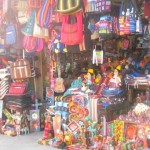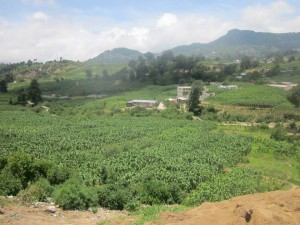the Haves vs. the Have Nots
The world may be perceived in terms of those who have and those who do not, or power structures. Power structures compose a complex system of regional to global actors that reflect control and status as an authority figure. Power however, can come in different forms. Societies are linked such that even lower and classes have a stake in their environment. Production and consumption for example are linked. Without a producer, a buyer will struggle to consume. Without a consumer, a producer takes on financial costs.

“A View from A Point: Ethnoecology as Situated Knowledge”
This work addresses the interpretation of cultural knowledge. When it comes to science, often the “Western” point of view is given more validation than perspectives from the rest of the world. Virginia Nazarea discusses the role ethnoecology has played in the past and the role she hopes it will play in the future. The discipline focusses on the local perspective and emphasizes that this perspective is just as if not more valuable than the West’s. Rather than just documenting local knowledge, Nazarea would like to see ethnoecologists implement local knowledge into action. Ethnoecology gives validation to the native’s point of view as legitimate for their given environment. The point of view with which one looks at environmental matters changes the narrative that is told or knowledge that is spread. Similarly, Nazarea emphasizes that a point of view is “fixed.” Even if two peoples are looking at an image or an environment, there will be different interpretations or constructed landscapes.
This can have implications towards any centralized or non-local implemented structures of environmental management. Ferguson and Lohmann’s “Anti-Politics Machine” underscores that the point of view instituted by international development agencies in Lesotho are coming from the agencies. Their point of view is a shared image of the country as “underdeveloped” and needing aid in order to “develop.” Nazarea’s work is important because local knowledge should not be undermined as ignorant in human environment relations. People have access to shared histories, observations, and interactions with their environment that provide unique insight into the world around them.
“The Anti-Politics Machine”

Many nongovernmental organizations and international governmental organizations establish themselves in countries with the goal of sustainable development. However, their attempts at development are at times ignorant of both what the local population wants and needs, and the impacts of addressing local, state, and global interests. James Ferguson and Larry Lohmann look at the Basotho in Lesotho, where NGOs and IGOs like the World Bank, UNDP, and USAID have made a presence. Their attempts at community development, strengthens state bureaucracy and has a major affect on politics rather than giving more autonomy to locals.Development projects are politically charged. Physical infrastructure brings peripheral towns in closer contact with the state center and control of natural resources changes Ferguson and Lohmann indicate that the relationship between developmental programs and the areas being “developed” should be reassessed, particularly because the country plays a larger role in industry and mining than is said. .
Descriptions of Lesotho have included the words “traditional,” “isolated,” and “rural,” words in which ideals of primitivity are connected. Perceptions of primitivity create a division between peoples. The non-primitive are developed and have taken a role of environmental stewardship, whereas the primitive are ignorant of their affect on the environment. The ethics of developmental programs are questionable because interests that are promised to be represented are not always represented. Similarly, this article also draws on the importance of ethnoecology in the representation of the local’s point of view of the environment and management.
“Differences and Conflict in the Struggle over Natural Resources: A Political Ecology Framework”
Within the conflicts over natural resources, economic reasons like resource distribution are likely to be highlighted.Ideals of modernity and sustainability are associated with capitalism and technology. Struggles of environmental proportions often have rich capitalists on one side of the argument, and poor anti-capitalists on the other. Arturo Escobar explains the struggle over natural resources occurs in economic, ecological, and cultural dimensions. Difference-in-equality, the equal respect of these different dimensions, is rarely achieved on regional or international scales.
Escobar uses a political ecology lens to analyze resource conflicts. While economic costs are applied to ecological services, monetary costs are not the only guiding criteria to arguments over resources. Critics do not focus on the cultural dimension as much as the economic and ecological. Cultural perceptions, however, are integral to the management of resources. Escobar calls for equality of distribution in all three dimensions. The consideration of the three dimensions is important to prevent the automatic associations between conflict and financial instability in specific regions of the world. Escobar creates a connection to Tsing’s idea of friction, where diversities are constantly being created through contact.
“Rural Household Demographics, Livelihoods and the Environment”
Population growth is not the sole factor driving environmental degradation. Population dynamics is a complex process driven by multiple factors. Sherbinin et. al approach rural households as important actors in population dynamics and in the use of natural resources. They study the linked livelihoods determined by the demographics of these households. The authors want to demonstrate that population is not blindly driven or a “problem” of the “developing” world. It is affected by particular households which differ in wealth.

Data is collected on the correlation between fertility, morbidity, mortality, and migration and household life cycles. Sherbin et. al look at capital — natural, social, human, physical and financial capital. The form of capital held by a household acts as a feedback mechanism within itself and in the consumption of natural resources. Roles change and pass on to and between family members, as do the forms of capital. Reduction of one type of capital can lead to heavier reliance on another sort of capital.
In terms of livelihood, a household might not look at increasing the number of kids, or cutting down trees as environmental destruction but as a solution to increasing their capital. The article is similar to Sodikoff’s article. While conservation agents in a protected area who lived in the village held financial capital over their fellow villagers, the villagers held social capital over them. As in Perdue and Pavela’s article, locality (such as rural) can provide insight into the role of natural resources.